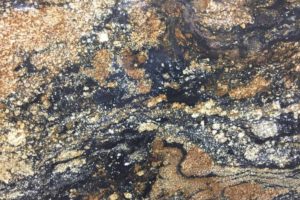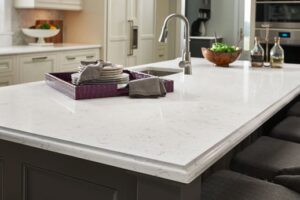
Travertine is a durable natural stone that is perfect for many projects, indoor or outdoor. It’s longevity is why travertine has been used in architecture for centuries. In fact, the Colosseum in Rome is almost entirely built of travertine, a testament to how long-lasting this material is. However, even the most durable materials will last longer and look better with the proper care. In this post we’re going to share our recommendations for how to clean travertine so you can enjoy it for years (or maybe even centuries).
When learning how to clean travertine it’s important to understand what kind of stone you’re dealing with. Travertine is a variety of limestone and while it is very long lasting it’s still sensitive to acidic substances (juice, wine, coffee) which can etch the finish rather easily. The porous nature of travertine means it can stain as well, but not as easily as commonly thought. Polished travertine is nearly stain-proof and stains on other finishes are generally controlled by sealing the surface. When choosing where to use travertine in your project we highly recommend powder bathroom vanity tops, table tops, tub surrounds, showers, floor tile and stone fireplace surrounds.
How to Clean Travertine
- Seal non-polished travertine surfaces to protect them from stains. This is as simple as wiping a sealant over the entire surface with a soft mop or cloth once a year.
- Blot up spills immediately as even sealed travertine is vulnerable to etching.
- Clean travertine with a sponge or soft cloth and hot water only. If you feel you have to use some kind of soap it’s best to choose a special stone cleaner.
- Protect travertine surfaces with coasters, trays for toiletries, and doormats or rugs in high traffic areas.
- To clean travertine floors use a dry, non-treated dust mop or sweep with a soft broom. This will take care of dust with out scratching the tiles.
Things to Avoid When Cleaning Travertine
- Do not use everyday cleaning products bought at your local store. Many contain acids, abrasives, and other chemicals that can damage the surface or degrade the sealant. Even mild soaps will dull surfaces over time.
- Avoid using vinegar, ammonia, lemon or orange to clean travertine. Their acidic or alkaline properties will damage the surface as well.
- Don’t use a vacuum on travertine floors. The wheels may scratch the surface especially if they are worn out or dirty.
- Never clean travertine with scouring pads or hard bristled brushes that can damage the surface.
If you follow these guidelines your travertine surfaces will remain a beautiful feature in your home for years to come. Interested in learning more about the benefits of travertine in your next project? Read more in this post or contact us today.





